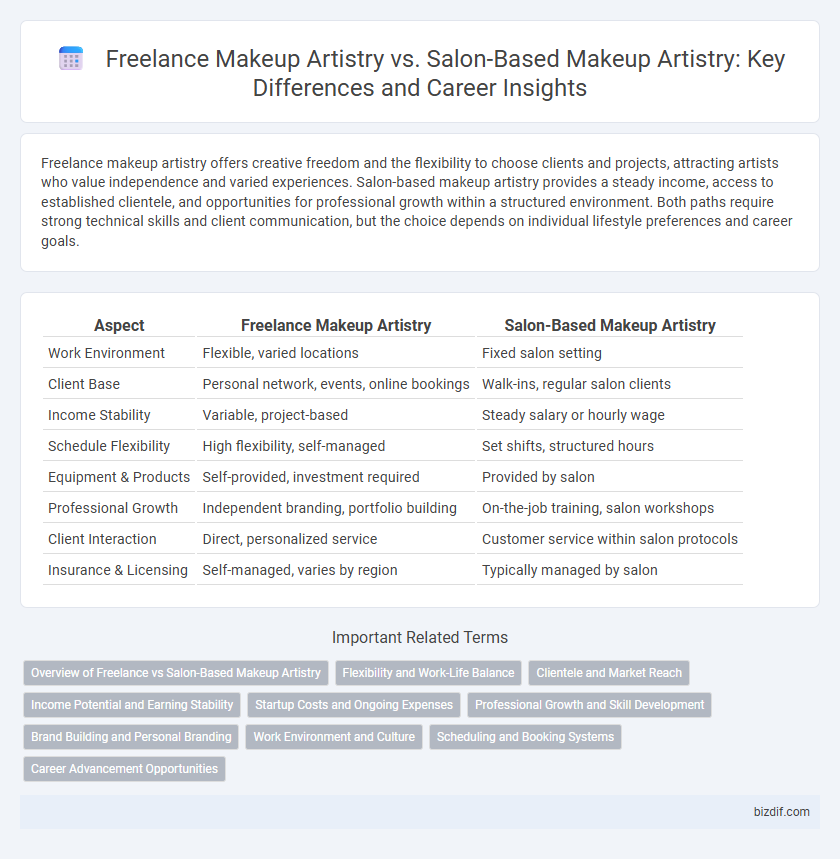Freelance makeup artistry offers creative freedom and the flexibility to choose clients and projects, attracting artists who value independence and varied experiences. Salon-based makeup artistry provides a steady income, access to established clientele, and opportunities for professional growth within a structured environment. Both paths require strong technical skills and client communication, but the choice depends on individual lifestyle preferences and career goals.
Table of Comparison
| Aspect | Freelance Makeup Artistry | Salon-Based Makeup Artistry |
|---|---|---|
| Work Environment | Flexible, varied locations | Fixed salon setting |
| Client Base | Personal network, events, online bookings | Walk-ins, regular salon clients |
| Income Stability | Variable, project-based | Steady salary or hourly wage |
| Schedule Flexibility | High flexibility, self-managed | Set shifts, structured hours |
| Equipment & Products | Self-provided, investment required | Provided by salon |
| Professional Growth | Independent branding, portfolio building | On-the-job training, salon workshops |
| Client Interaction | Direct, personalized service | Customer service within salon protocols |
| Insurance & Licensing | Self-managed, varies by region | Typically managed by salon |
Overview of Freelance vs Salon-Based Makeup Artistry
Freelance makeup artistry offers flexibility, allowing artists to work across diverse locations and clientele, often requiring strong self-marketing and business management skills. Salon-based makeup artists benefit from a steady client flow, professional support, and access to salon resources but may face limited creative freedom and fixed schedules. Both paths demand expertise in beauty trends, product knowledge, and client consultation to deliver personalized makeup services effectively.
Flexibility and Work-Life Balance
Freelance makeup artistry offers unparalleled flexibility, allowing artists to set their own schedules and choose clients, fostering a better work-life balance tailored to personal preferences. Salon-based makeup artists often adhere to fixed hours and client appointments imposed by the salon, which can limit personal time and reduce overall flexibility. The autonomy in freelance work supports creative freedom and scheduling adaptability, whereas salon positions provide stability but may compromise work-life harmony.
Clientele and Market Reach
Freelance makeup artists often have a broader clientele and greater market reach due to their flexibility in location and ability to collaborate on diverse projects such as weddings, photoshoots, and events. Salon-based makeup artists typically benefit from a loyal, walk-in clientele and steady local exposure, but their market reach may be limited by the salon's geographic location. Leveraging social media and networking can significantly expand clientele for both freelance and salon-based makeup artists.
Income Potential and Earning Stability
Freelance makeup artistry offers variable income potential, often fluctuating based on client demand, project frequency, and personal marketing efforts, allowing for potentially higher earnings during peak seasons but with less predictable stability. Salon-based makeup artists typically benefit from a steadier income through consistent client bookings, regular hours, and potential commissions, although their earning ceiling may be limited compared to freelancers. Both career paths require skill mastery and client relationship management, but freelancers must navigate income unpredictability while salon artists enjoy more financial consistency.
Startup Costs and Ongoing Expenses
Freelance makeup artists face lower startup costs, typically investing in a personalized kit and marketing, while salon-based artists incur expenses related to booth rental or salon fees. Ongoing expenses for freelancers include product replenishment and self-promotion, whereas salon artists often share product costs with the salon but pay consistent monthly fees. Understanding these financial dynamics is crucial for makeup artists when choosing between independent freelancing and salon employment.
Professional Growth and Skill Development
Freelance makeup artistry offers diverse client exposure, fostering adaptability and innovation essential for rapid professional growth and skill expansion. Salon-based makeup artistry provides structured training, consistent feedback, and access to advanced techniques, creating a stable environment for mastering foundational skills. Both paths contribute uniquely to developing expertise, with freelancers gaining entrepreneurial skills while salon artists benefit from collaborative learning opportunities.
Brand Building and Personal Branding
Freelance makeup artists have greater control over brand building by creating a unique personal brand, leveraging social media, and directly engaging with clients to cultivate a loyal following. Salon-based makeup artists benefit from the salon's established reputation and built-in client base but may face limitations in differentiating their individual brand identity. Strategic personal branding through portfolio development, client testimonials, and consistent visual aesthetics is essential for freelance artists to compete with the visibility provided by salons.
Work Environment and Culture
Freelance makeup artistry offers a flexible work environment where artists independently manage schedules and client relationships, fostering creative freedom and diverse project opportunities. Salon-based makeup artistry operates within a structured setting, providing consistent access to professional tools, product inventory, and collaborative interactions with stylists and other beauty professionals. The culture in salons emphasizes teamwork, brand representation, and client retention, while freelance artists cultivate a personalized brand identity and direct client engagement.
Scheduling and Booking Systems
Freelance makeup artists often rely on flexible, app-based booking systems like Acuity or Fresha to manage client appointments and accommodate varying schedules. In contrast, salon-based makeup artists typically use integrated salon management software, such as Vagaro or Booker, which streamlines booking alongside other services and staff coordination. Efficient scheduling systems are crucial in both settings to optimize client flow, minimize downtime, and enhance overall service delivery.
Career Advancement Opportunities
Freelance makeup artists often experience greater career advancement opportunities through diverse client exposure, flexible project types, and networking across various industries like fashion, film, and weddings. Salon-based makeup artists benefit from a steady client base, skill development under experienced professionals, and potential promotions to senior or managerial roles within the salon environment. Choosing between freelance and salon-based makeup artistry impacts access to career growth through varied experiences versus structured progression.
Freelance makeup artistry vs Salon-based makeup artistry Infographic

 bizdif.com
bizdif.com